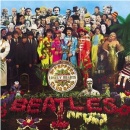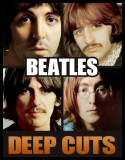Music Home / Entertainment Channel / Bullz-Eye Home
 Buy your copy from Amazon.com
Buy your copy from Amazon.com
| The Beatles: Sgt. Pepper’s Lonely Hearts Club Band Released: 2007 |
So, yeah. Sgt. Pepper came out 40 years ago, and it’s my task to write about it. There’s just one teensy weensy problem: what on earth do you say about the album that has been discussed, dissected and analyzed more than any album in music history? It practically has its own religion, it’s so big, and everyone who’s anyone (along with several other everyones who aren’t anyone) has already said anything that may spring into my small, sleepy, booze-addled brain. Here goes nothing.
It seems as though Sgt. Pepper has become a target of late; apparently, the music community is tired of seeing it repeatedly hailed as the best album of all time. Actually, that sentiment is not a new one: it started in the late ‘80s, when a British poll declared the Smiths’ The Queen is Dead to be the best album ever. (To put things in perspective, though, the poll also had Depeche Mode’s Music for the Masses in the Top 10.) To add insult to injury, not only is Sgt. Pepper no longer considered to be the best album of all time, but it is no longer the best Beatles album, either. Revolver is the new king, though The Beatles (a.k.a. The White Album) still has its ardent supporters as well. While I will readily admit that Revolver is my favorite Beatles album, let’s put things into perspective. If the leap in growth between Rubber Soul and Revolver is equivalent to a transatlantic flight, the difference between Revolver and Sgt. Pepper is a rocket to Mars. Not the Moon; Mars, people. Simply put, no one saw Sgt. Pepper coming, and when it landed, it changed everything.
The decision to stop touring clearly opened the band’s eyes in terms of what they could accomplish in the studio. “Good Morning Good Morning” seemed to be missing something, even with Ringo’s tom-happy drumming. The solution: horn section, only distort the living shit out of it. Oh, and throw in a chain of animal sounds, ending with a chicken clucking so it will offer a good segue way into George’s guitar on the reprise of the title track. Paul’s tear-jerker “She’s Leaving Home” was tailor-made for a string section, while both horns and strings would get together on “A Day in the Life” and do something that was unthinkable for a pop song at the time: take 24 bars to go from the lowest note on their respective instruments to the highest, then land on an E major. How can you possibly follow up a sound like that? With the biggest chord ever recorded. Six guys on three pianos, all banging at the same time. Joey Ramone once said that chord was the heaviest thing he’d ever heard.
It’s been oft-repeated that Sgt. Pepper was Paul’s baby, so inspired was he after hearing Pet Sounds, an album made by Brian Wilson after he was inspired by Rubber Soul. Paul is easily the dominant songwriter on Sgt. Pepper, relegating John to four songs – though those four songs, “Good Morning Good Morning,” “A Day in the Life,” “Being for the Benefit of Mr. Kite” and “Lucy in the Sky with Diamonds,” are arguably the album’s finest moments – and George to one. That one George song, though, is quite possibly the most divisive song in the Beatles catalog. “Within You Without You” is Revolver track “Love You To” taken as far East as it can go. To quote the late, great Bill Hicks, George was so high when he wrote this song that they had to pull him off the ceiling with a rake. The song is actually George with a bunch of uncredited Indian musicians (none of the other Beatles play on it), and was originally 30 minutes long. Again, heavy.
Is there anything left to say about Paul’s songs? He’s 65 now, so “When I’m Sixty-Four” must carry a poignancy that was lost on him at the time. “Getting Better” always felt to me like Paul trying to out-Monkee the Monkees. “Lovely Rita” was catchy but silly, saved by John’s exquisite backing vocals. And then there’s the beatnik-y “Fixing a Hole,” which John surely hated.
So why five stars for an album that, in hindsight, has some less-than-five-star moments? Because even on their worst day, the Beatles were playing a completely different sport than everyone else, and Sgt. Pepper was a completely different version of that sport. After all, they made the album under the guise that they were Sgt. Pepper’s Lonely Hearts Club Band, not the Beatles. Who in the world had even dreamed of an idea like that at the time? Most albums released in the ‘60s were just a way of collecting singles, but with Sgt. Pepper, the Beatles blew that notion, along with every other notion of what an album should be, out of the water.
davidm@bullz-eye.com






